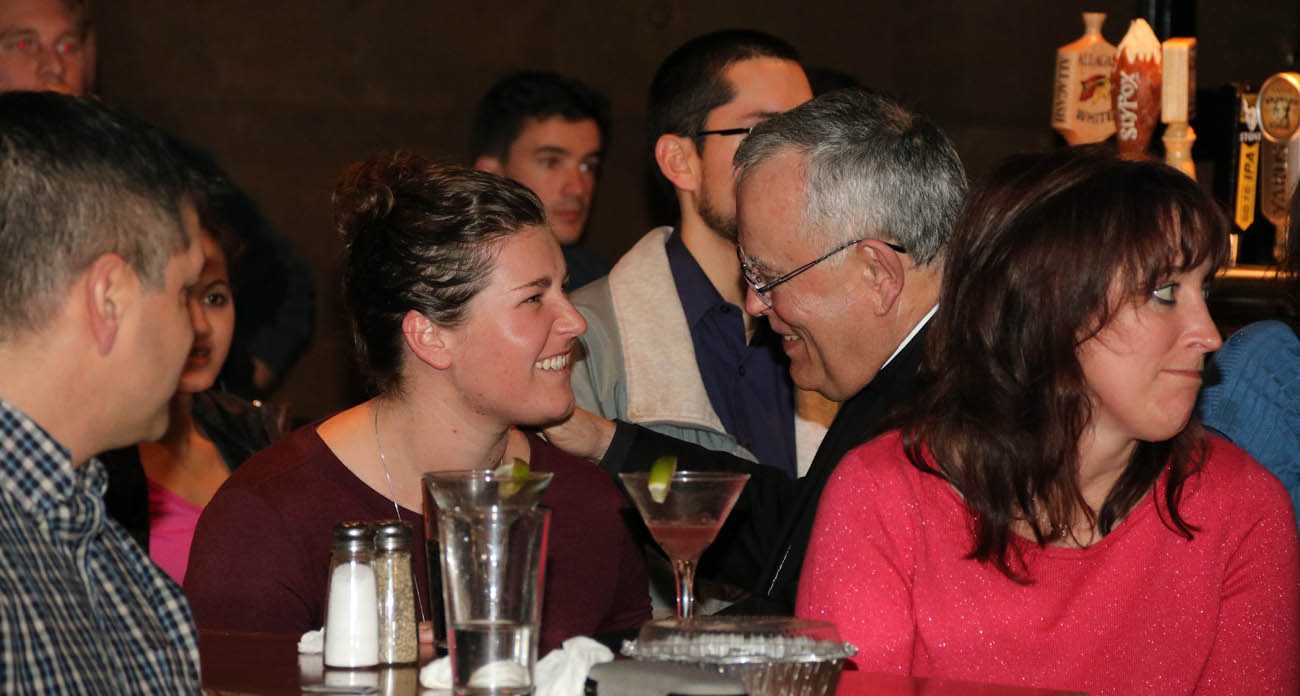INDIANAPOLIS (CNS) — Many studies over the past several years have shown that a growing number of young adults in American society have abandoned the faith with which they were raised, and now identify themselves with no organized religion.
This has been shown to be common among young adult Catholics, in particular.
In the Indianapolis Archdiocese, St. Meinrad Seminary and School of Theology in St. Meinrad is launching an initiative to help parishes reach out to young adult Catholics and help them rediscover and renew their Catholic identity.
[hotblock]
Late last year, St. Meinrad received a $1.38 million grant from the Indianapolis-based Lilly Endowment to support the initiative.
The grant is part of a broader $19.4 million initiative focused on young adults and faith in which the Lilly Endowment is partnering with 13 Christian institutions across the country. St. Meinrad is the only Catholic organization among them.
“We are very pleased that our programs with Lilly have been so successful in the past that we are now looking to grow and develop in this new direction,” said Benedictine Father Denis Robinson, St. Meinrad’s president-rector.
Tammy Becht will oversee St. Meinrad’s program to help parishes reach out to young adults. She also is director of St. Meinrad’s One Bread One Cup, a program of liturgical formation for youths and young adults.
“Young adults are leaving churches across denominational lines at an alarming rate,” said Becht, a member of Our Lady of Perpetual Help Parish in New Albany. “We’re not in this alone. It’s across Christianity. And my suspicion is that it’s in other faiths as well. We would do well to take a good, long look at this. Obviously, what we’re doing isn’t working.”
[hotblock2]
Becht said the key to renewing the Catholic Church’s ministry to and with young adults is to go out to where they are instead of “waiting for them to come where we are.”
“Our idea is to go … to be with them in their world and ask what their needs are,” she told The Criterion, newspaper of the Indianapolis Archdiocese. “How do they meet their need for belonging? How do they meet their need to come together as a Christian community? If they’re not coming to church, how are they meeting that need?”
St. Meinrad plans on working over the next five years with 12 to 15 parishes within a 250- to 300-mile-wide radius of the southern Indiana seminary.
Each parish participating in the program will assess itself in regard to young adults, and seek to learn about this population group that is already within it and those who live in its vicinity but are not connected to the parish.
The parish then would build up a core group of volunteer ministry leaders who would receive training from St. Meinrad to effectively reach out to young adult Catholics in the broader community and help them build up their faith.
A key way that the St. Meinrad program will promote this is through the encouragement of an intentional life of faith and prayer in the young adults’ life at home.
Becht said St. Meinrad is well positioned to take this approach to young adult ministry because its monastic and seminary communities do this themselves every day on “the hill” on which they live in southern Indiana.
“It’s the rhythm that takes place every day on the hill — prayer, work, common meals,” she said. “The living out of the Christian life that takes place on the hill is a model for the rest of the church.”
One way that St. Meinrad will foster a life of prayer and rituals at home for young adults is through the development of a prayer book for them.
[hotblock3]
“We hope to use it as a resource book for young people in creating their Catholic Christian home,” Becht said. “We hope to help them consider how, when, and whom to invite into their domestic church as they discern (their) vocation. In turn, the domestic church supports the parish via interaction, connection, support and engagement.”
Father Robinson said helping young adults build up faith rituals in their daily life can be a way to connect them to parishes.
“The parish is an essential place for the program to gain life,” he said. “And so our hope is that the domestic rituals being practiced through the program lead our participants to a more fruitful, deeper appreciation of the liturgical life of the parish.”
St. Bartholomew Parish in Columbus may be one of the faith communities that St. Meinrad will work with through this program.
Father Andrew Syberg, St. Bartholomew’s associate pastor, said his parish has young adults among its members, but also acknowledges that the broader Columbus community has many Catholics in their 20s and 30s who are not practicing their faith.
“There are tons of young families, tons of kids here,” he said. “But then there are a lot of young adults who are single and still doing their discernment. We have to do something. I don’t want to lose these people.”
St. Bartholomew, Father Syberg said, offers young adults service opportunities, times of prayer and eucharistic adoration, and the chance to help with its youth group.
“When you can convince them and they get on board, there are few groups of people who will become more on fire for the faith than young adults will,” he said. “The idea is to reclaim that identity that, for a young adult, can very easily get lost in the discordant battling of the world.”
Father Syberg added, “Helping our young adults navigate this world through the lens of faith is becoming more important with each passing week. It is a most worthy conversation to have.”
***
Gallagher is a reporter at The Criterion, newspaper of the Archdiocese of Indianapolis.
PREVIOUS: Corned beef conundrum: Some dioceses give St. Patrick’s Day dispensation
NEXT: Video series offers Catholics Gospel guidance for their Lenten journey




Share this story